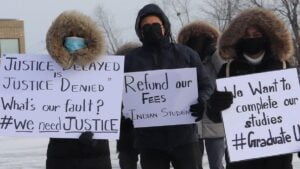ButSpeak.com
News which Matters.

Hundreds of Indian student graduates are protesting in Canada against a new federal policy that puts over 70,000 at risk of deportation, as the government cuts back on permanent residency and work permits.
Hundreds of Indian student graduates in Canada have taken to the streets, protesting against a new federal immigration policy that threatens their future in the country. The policy, which aims to reduce permanent residency nominations by 25% and limit study permits, has left over 70,000 international students, particularly those from India, facing the risk of deportation.
For more than three months, Indian students have been camping outside the legislative assembly in Prince Edward Island, with similar protests erupting across the provinces of Ontario, Manitoba, and British Columbia. The sudden policy change has thrown the dreams of many aspiring immigrants into turmoil, as they had hoped to build a better life in Canada.
The new measures are part of the Canadian government’s response to the rapid population growth fueled by immigration in recent years. In fact, 97% of Canada’s population increase last year was driven by immigration, according to federal data. Amid a local housing and jobs crisis, Prime Minister Justin Trudeau’s administration is under pressure to curb the number of temporary residents, a move that comes as Trudeau faces declining poll numbers ahead of a likely election next year.
Student advocacy groups, like the Naujawan Support Network, warn that many graduates could be deported when their work permits expire at the end of the year. “I spent the most crucial six years of my life taking many risks to come to Canada,” says Mehakdeep Singh, a former international student now facing deportation. Singh, like many others, invested his family’s savings into his education in Canada, expecting to eventually secure permanent residency. “For the past six years, I studied, I worked, I paid taxes, I earned enough CRS (Comprehensive Ranking System) points but the government has just taken advantage of us,” he lamented.
The Canadian government is also scaling back the temporary foreign worker program, which was expanded in 2022 to address labor shortages. Employment and Social Development Canada (ESDC) reported that 183,820 temporary foreign worker permits were issued in 2023, an 88% increase from 2019. However, the ESDC has criticized employers for using the program to bypass hiring domestic talent. Under the new changes, work permits will be denied in regions with an unemployment rate of 6% or higher, although exemptions will apply to sectors like agriculture, food processing, construction, and healthcare.
In response to the growing unrest, Prime Minister Trudeau stated, “We’re looking at the various streams to make sure that as we move forward, Canada remains a place that is positive in its support for immigration, but also responsible in the way we integrate and make sure there’s pathways to success for everyone who comes to Canada.”
The government has committed to additional measures to reduce the temporary resident population to 5% of Canada’s total population within three years. Meanwhile, the International Sikh Student Organization, another advocacy group, argues that the real roots of Canada’s employment and housing issues lie in broader policy failures, rather than in the presence of international students.
As the protests continue, the fate of thousands of students remains uncertain, highlighting the complex challenges of immigration policy in a rapidly changing global landscape.